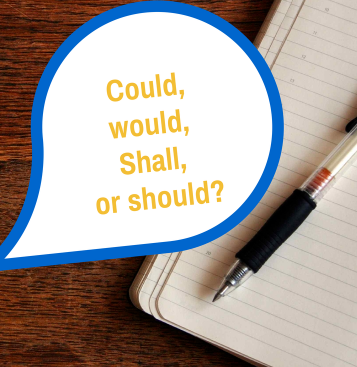助动词 (Auxiliary Verbs):
助动词本身并没有词义, 它是用来帮助主要动词形成各种时态、语气、语态、疑问句、或否定句。
1. be (am, are, is, was, were, be, being, been)
进行式(be+ing): I’m doing my homework. 我正在做功课。
被动语态(be+p.p.): His computer is broken. 他的电脑坏了。
2. have (has, had)
完成式(have/has+p.p.): We have finished our report. 我们做完报告了。
过去完成式(had+p.p): The news had been confirmed by the authority.这则消息已经被官方证实了。
3. do (does, did)
疑问句: Does it cost a lot? 它很贵吗?
否定句: I don’t like your tone. 我不喜欢你的语气。
加强语气: I do like her. 我真的很喜欢她。
代替前面的主动词: Jason eats faster than Ashley does. Jason吃得比Ashley还要快。
* be, have, do也可以当主要动词来使用
ex: I am a college student. 我是个大学学生。
She has two kids. 她有两个小孩。
I do what I like. 我想干嘛就干嘛。
情态助动词 (Modal Auxiliary Verbs):
情态助动词置于主要动词之前来表达不同的语气或态度
*在情态助动词后得接原型动词
1. Can: 有能力(能,会);允许(可以,能);请求(能,可以);可能性
I can swim. 我会游泳。
You can’t play video games. 你不可以打电动。
Can I go to bathroom? 我可以去上厕所吗?
This can’t be happening to me! 这不可能真的发生在我身上了!

2. Could: 有能力(能,会);请求;建议;应该;猜测
*Could 有Can的过去式用法,也是比较客气、委婉的用法
I could drive before I had the accident. 在发生那场车祸前我还能够开车。
Could you hand me the sugar? 你可以把糖递给我吗?
He could be watching the football game. 他应该在看美式足球赛吧。
We could help if you want. 如果你想要,我们可以帮忙。
3. May: 允许(可以,能);祝愿;猜测
May I leave now? 我可以离开了吗?
May the odds be ever in your favor. 愿机会永远对你有利。
It may rain today. 今天有可能会下雨。
She may not know what is happening. 她可能还不知道发生了什么事。
4. Might: 可能、可以;猜测
*may的过去式通常用在假设语气以及责备语气,另外may 和 might 都可以用来表示「可能性」,而 might 表示「较不确定,希望比较小」
I might actually help you if you didn’t give me that attitude. 如果你没对我摆脸色,我搞不好真的会帮你。
Your keys might be on the desk. 你的钥匙可能在书桌上。
5.Must: 责任、义务(必须, 非…不可);告诫;命令(一定要); 猜测
I must call your parents. 我必须要打给你的父母。
You must stop drinking. 你不能再喝酒了。
You mustn’t (must not) open other people’s letters. 你绝对不能打开别人的信件。
It must be fun. 那一定很好玩。
6. ought to: 责任或义务(应该,应当);可能性
You ought to look out. 你应该要小心。
She ought to be here by now. 她现在应该要到了。
7. should: 责任(应该,应当);可能性(将, 会)
*当表示「将来」时Should 为Shall的过去式,但表示「应该」时则与Shall无关
You should accept this case. 你应该要接下这个案子。
You shouldn’t eat my cake! 你不应该吃掉我的蛋糕!
Should I go with them? 我应该要跟他们走吗?
You should find it useful. 你会发现它很有用。
8. shall: 建议;未来式
*shall 的意思和 will 相同,也是用来表示「未来式」中,但仅限于用在「第一人称」也是一种比较正式的用法,而现在shall已经很少被使用,通常只会出现在正式的规章里。
I shall meet her now. 我要去跟她碰面了。
Shall we go now? 我们要走了吗?
The buyer shall be at least 21 year-old. 买家得要至少年满21岁。
You shall not pass! 你不能够通过!
9. will: 命令(会、必须);可以、能;愿意;未来式
You will obey me! 你会服从我!
The room will fit all the people. 这个房间能容的下所有人。
Will you marry me? 你愿意嫁给我吗?
I will finish it myself. 我会自己完成它。
10. would: 要求;希望、但愿;愿意;未来式
*Will的过去式(用来表示过去未来式),也是客气、委婉的用法
Would you pass me the beef? 可以把牛肉传给我吗?
I wish it would stop raining. 我希望这场雨可以停下来。
I would like to go. 我很愿意参加。
She said she would come. 她说她会来的。







